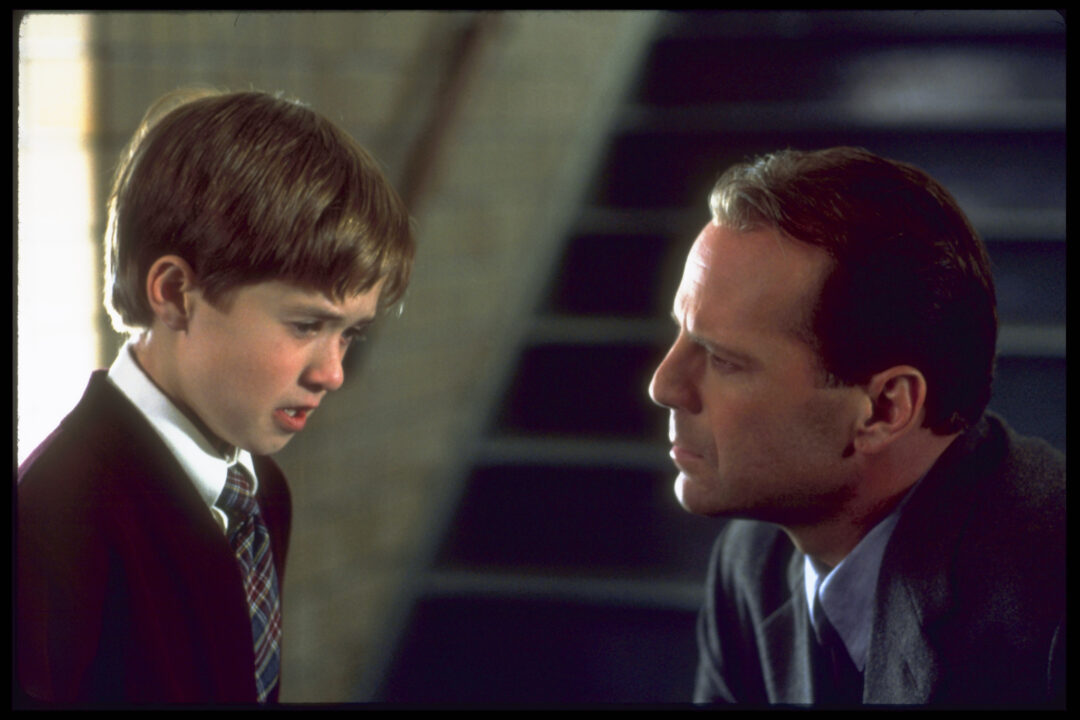In the spirit of the Halloween season, my wife and I were recently looking for a scary movie to watch on a Saturday night. Neither one of us really enjoys gory or psychologically disturbing horror movies, so we settled on M. Night Shyamalan’s 1999 debut film The Sixth Sense. My wife had actually never seen it, although she obviously knew the “I see dead people” twist that has since become an inescapable pop culture reference and meme, so I was excited to see how she would react to it.

I first saw The Sixth Sense in a movie theater as a seventeen-year-old, and I thought it was absolutely brilliant. The jump-in-your-seat moments were perfectly unnerving, the cast gave solidly spooky performances, and the film’s twist was a revelation of cinematic storytelling for me. I still hold it in high regard alongside Memento, The Prestige, and The Usual Suspects in terms of movies with the most mind-bending twist endings. Since I had not watched it in more than a decade, I could not remember all the details and was excited to revisit a film that had had such an impact on me.
When analyzing any work of art, your personal circumstances and current baggage will undoubtedly inform your interpretation.
I was not prepared for the effect this rewatch would have on me. The film itself remained the same (and a spoiler alert is in effect from here on out)—Bruce Willis gives an effectively subdued performance as award-winning, workaholic child psychologist named Dr. Malcolm Crowe who gets shot in his home in the opening scene by a now grown-up former patient who blames him for not solving his psychological issues. We see Malcolm’s distraught wife rush to aid her husband, then the film flashes forward to the following fall, when he appears to be fully recovered and regularly counseling Cole Sear, a psychologically disturbed child played to perfection by an eleven-year-old Haley Joel Osment. The audience learns more about the details of Cole’s psychosis and his “ability,” while Malcolm’s marriage seems to be falling apart and he grows increasingly distraught over his inability to help Cole, who reminds him so much of the former patient who shot him.
As the movie unfolded, I realized that I had changed drastically since the last time I watched it—a fact that profoundly changed my experience of the movie. When analyzing any work of art, your personal circumstances and current baggage will undoubtedly inform your interpretation. This time around—watching the film as a happily married forty-year-old father of four young children—I found myself paying much less attention to the trailer-bait, jumpy scenes of the ghosts and far more attention to the personal, marital, and parental relationships depicted in the film.
My wife and I were expecting to enjoy a scary movie together, but instead we experienced an emotional rollercoaster that left us thinking about our marriage, our children, and our mortality. With All Souls Day last week, ‘tis the season, I guess?

With regard to marriage, the film acts as a stirring memento mori, with the opening scene showing Malcolm and his wife enjoying a fun and playful evening together after he received an award for his professional work. The mood is violently interrupted when they realize that someone has broken into their home and the former patient shoots Malcolm in the stomach. When we see them together again later in the film, his wife is not talking to him for eventually obvious paranormal reasons, but we assume that she is giving him the silent treatment as they grow apart in their marriage.
Standup comedian Nate Bergatze has a funny bit that encapsulates the change in their relationship as depicted in the film—and the audience’s willingness to not question it. “You know, we just thought his wife wasn’t talking to him for like a year. That made more sense to us than him possibly being dead,” Bergatze joked. “We see him get shot, and we still watched it for two hours just like, ‘I know what this guy’s going through. This is a movie about marriage and how hard marriage is. Even if you get shot, it’s your fault.’”
Jokes aside, the film is about marriage . . . and also about faith. The entire premise is that the ghosts have unfinished business or “messages” to send to those among the living, and that they will be at peace once Cole decides to help them deliver those messages. Malcolm’s ghostly condition is tied to unresolved issues with his wife, a stirring reminder that we don’t know how much time we have with our loved ones, and that leaving things unsaid is a dangerous policy for ghosts and mortals.
As it says in the Gospel of Matthew, we do not know the day or the hour of our deaths (Matt. 24:36), so we must treasure every moment of life, especially when times are good, and live in such a way that we are always prepared for the bridegroom to return (Matt. 25:1-13).
Forgiveness of ourselves and others can be the perfect balm to let these ghosts of the past fade away.
So, how do we stay prepared? The older I get, the more aware I become of the impermanence of life and the more I strive to invest myself in the present moment. Sometimes change is wrought through the tragic effects of violence or sudden illness. Other times it is simply a change in circumstances, geography or the transitions of age that move people into or out of our lives. The awareness that change—much like death—often seems uncomfortable and undesirable, but is also inevitable, is the first step toward accepting it. We can make the most of the present moment by intentionally sharing our gifts with those around us and loving without counting the cost.
The Sixth Sense gets a lot of mileage out of this theme, with both the living and dead characters mourning what has been changed or lost in their personal relationships and ultimately turning to acts of love and service as a way to resolve their situations.
Cole’s divorced mother laments her difficulties in supporting her son and the unresolved tension she had with her own deceased mother. Cole laments the breakdown of his nuclear family, trying desperately to please his overworked mother and memorializing his absentee father by wearing his oversized glasses frames and broken watch.

Malcolm laments his failure to help his murderous former patient and is afraid of failing Cole in the same way. He also laments what he perceives to be his failing relationship with his wife. These two conditions are, in fact, what keep him from moving on from the world of the living.
One aspect of the film’s twist is that the ghosts can only “see what they want to see,” which is why Malcolm doesn’t realize on his own that he’s dead. When he joins his wife for an anniversary dinner and she sits across from him in silence, it’s because he’s invisible to her, not because she is pondering a divorce. When he repeatedly tries to enter his basement office and the door won’t open, it’s not because it is locked, it’s because a table has been moved to block the door after Malcolm died.
While we might not be actively haunting anyone, we all have failures and experiences that are holding us to moments in the past, sometimes preventing us from realizing God’s potential for us and often stopping us from fully embracing the blessings of our present circumstances. Forgiveness of ourselves and others can be the perfect balm to let these ghosts of the past fade away. When we see with the eyes of faith, we can root out our blind spots and move the unseen tables that are preventing us from opening doors in our own lives.
It was a pleasure to revisit this classic movie and glean some deeper insights this time around, even if my wife and I found ourselves tearing up as the credits rolled and felt the urge to go upstairs and hug our sleeping children. As we pray for all of the faithfully departed this month, may we also feel a renewed sense of our own mortality and appreciate the blessing of every precious moment of life.
